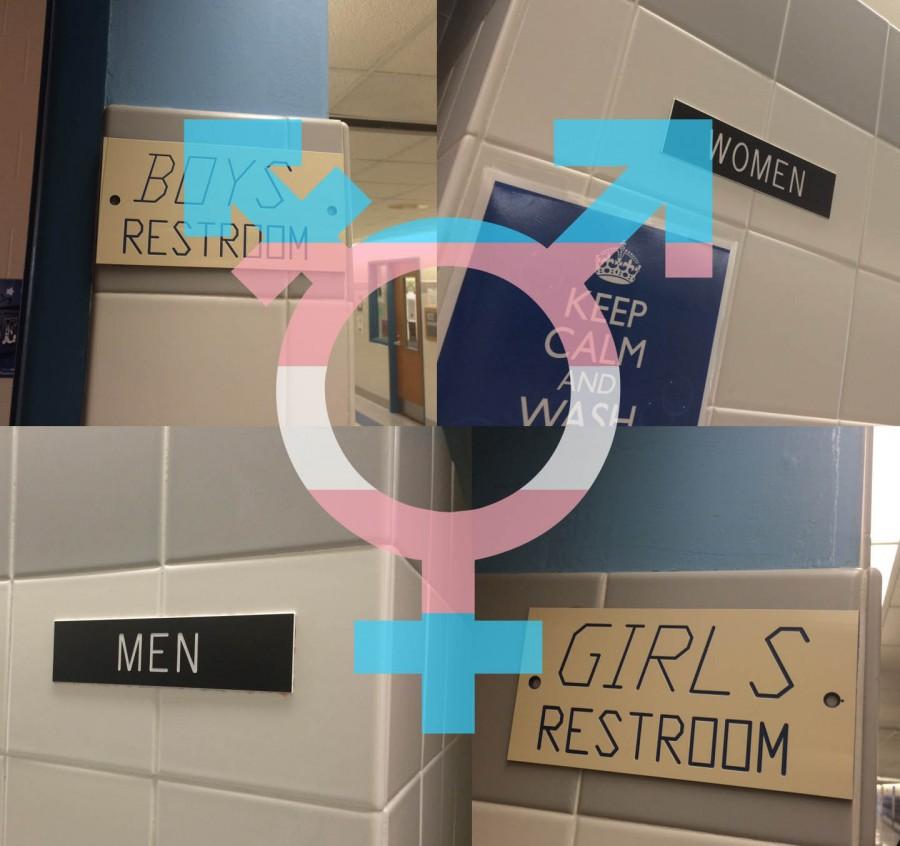Hatred, Prejudice, and Fear-mongering: Transgender Discrimination
Transgender rights always have and always will be a seriously complicated issue, and there’s nothing we can really do to uncomplicate it. In particular, many are divided by the issue of the rights of transgender men and women to use restrooms corresponding to their preferred gender identity.
The LGBT rights group GLAAD defines transgender as a term “used to describe people whose gender identity differs from the sex the doctor marked on their birth certificate.”
People might raise their eyebrows and question, “what’s the big deal with bathrooms?” Many don’t really tend to think how difficult it is for some transgender Americans to use them. In some states, numerous attempts have been made to pass laws, nicknamed “bathroom bills,” which restrict the rights for transgender individuals to use public restrooms.
“Everybody’s gotta pee,” senior Emily Marrero said. “I think it’s ridiculous to stop trans people from using the bathrooms they want to use.”
Most recently, while I was in the process of writing this article, North Carolina passed a law that prohibits transgender people from using restrooms corresponding to their gender identity. This is actually very dangerous, because many transgender people undergo Hormone Replacement Therapy (HRT), meaning testosterone or estrogen, which changes their physical appearance. Laws that limit bathroom usage to birth-sex only can place transgender people in very uncomfortable and even dangerous situations simply for wanting to use toilets.
Some believe passing laws like this would somehow protect people from possible “danger.” Many religious anti-LGBT lobbies including the Family Research Council, the not-so-subtly-named “Americans for Truth About Homosexuality,” the Focus on the Family, and the National Organization for Marriage have advocated and still firmly believe that these laws should be passed. These groups passionately believe that transgender people pose a threat to society, comparing them to pedophiles and rapists and believing that they put young children in danger.
The other less radical, but still undeniably transphobic, view is that male sex offenders will take advantage of anti-discrimination ordinances to harass and assault women.
The FRC, for example, claims that anti-discrimination protection makes it “impossible for a young girl to determine whether or not the man [sic] in the restroom is a ‘peeping tom,’ a rapist or a pedophile,” and that “Legislators should not allow the rights of transgendered men [sic] to transcend the rights of women and vulnerable children.”
Despite the fact that there has been no real concrete evidence of transgender individuals sexually assaulting women in bathrooms in the U.S., using sex offense, which is a serious issue, as an excuse to restrict the rights of someone who’s different from you from using the toilet is cruel and unusual treatment.
“I can understand people being uncomfortable with transgender people using the bathrooms opposite the sex they were born with,” junior Caleb Bauder said, “but I think banning transgender people from using them is too strict and unnecessary.”
The common misconception of transgender women in particular is that they’re just men in dresses and makeup and that the transgender rights movement isn’t a real civil rights movement. If someone were to overgeneralize and stereotype all men as testosterone-ridden alcoholics who abuse women, when in fact they aren’t, people would find it extremely offensive; but just try to imagine how it feels to transgender people when they’re all generalized as Mrs. Doubtfire-esque crossdressers, when in fact they aren’t.
Sentiments like these may seem harmless at first glance, but when amplified by religious leaders and politicians, they can cause a snowball effect of prejudice and mistrust towards trans people that could legitimately result in restrictions to trans people’s rights. Transgender people can also be individually affected by these sentiments.
According to a poll conducted by the National Center for Transgender Equality, 63 percent of participants reported that they have experienced “serious acts of discrimination.” This includes experiencing the loss of their jobs, eviction and homelessness, physical and sexual harassment, and severe bullying simply because they’re transgender.
I completely understand that some have negative opinions towards transgender people, and I know that there’s not much I can do to change that. However, having a different opinion doesn’t entail the right to discriminate. Being hateful or negative towards transgender people can significantly lower their quality of life.
Trans people are people, just like everyone else. They are not objects, and don’t deserve to be mistreated and abused by society. It may be said again and again and sound cliché, but there’s absolutely no need to be disrespectful and hateful towards someone simply because they’re different.
Whether you’re male or female, cisgender or transgender; we should all embrace the classical idea of “do unto others as you would do unto yourself,” and ensure that no bathroom bills are passed in our state like the one in North Carolina, or the ones constantly being proposed around the country. Some may not be comfortable with the idea of being transgender, but that is never an excuse to restrict the rights of other people. It may not seem like a big deal, but it sure might mean a lot to someone else.

Senior Jamie Kish is a former three-year staff reporter and two-year entertainment editor for the Spotlight. This year Jamie continues to serve as a contributor...


